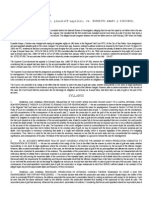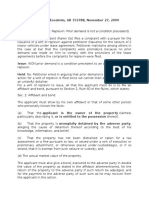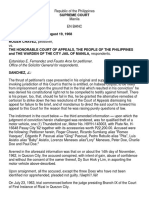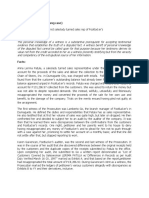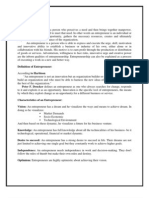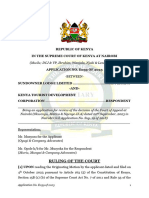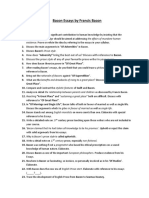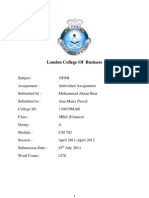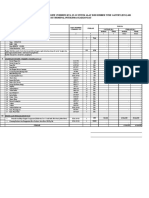0 ratings0% found this document useful (0 votes)
172 viewsPatula Vs PP
Patula Vs PP
Uploaded by
d.mariAnna Lerima Patula was charged with estafa for allegedly collecting over P131,000 from customers at her job but failing to remit the funds to her employer, FootLocker. At trial, the prosecution relied on the testimony of Karen Guivencan, an auditor who investigated the matter, and documents showing customer balances. However, Guivencan conceded she had no personal knowledge of the customer transactions or amounts remitted by Patula. The court found Guivencan's testimony and the documents to be inadmissible hearsay, as Guivencan relied on information from others who were not presented in court and could not be cross-examined. Without direct evidence of misappropriation,
Copyright:
© All Rights Reserved
Available Formats
Download as DOCX, PDF, TXT or read online from Scribd
Patula Vs PP
Patula Vs PP
Uploaded by
d.mari0 ratings0% found this document useful (0 votes)
172 views2 pagesAnna Lerima Patula was charged with estafa for allegedly collecting over P131,000 from customers at her job but failing to remit the funds to her employer, FootLocker. At trial, the prosecution relied on the testimony of Karen Guivencan, an auditor who investigated the matter, and documents showing customer balances. However, Guivencan conceded she had no personal knowledge of the customer transactions or amounts remitted by Patula. The court found Guivencan's testimony and the documents to be inadmissible hearsay, as Guivencan relied on information from others who were not presented in court and could not be cross-examined. Without direct evidence of misappropriation,
Original Description:
EVIDENCE
Original Title
Patula vs Pp
Copyright
© © All Rights Reserved
Available Formats
DOCX, PDF, TXT or read online from Scribd
Share this document
Did you find this document useful?
Is this content inappropriate?
Anna Lerima Patula was charged with estafa for allegedly collecting over P131,000 from customers at her job but failing to remit the funds to her employer, FootLocker. At trial, the prosecution relied on the testimony of Karen Guivencan, an auditor who investigated the matter, and documents showing customer balances. However, Guivencan conceded she had no personal knowledge of the customer transactions or amounts remitted by Patula. The court found Guivencan's testimony and the documents to be inadmissible hearsay, as Guivencan relied on information from others who were not presented in court and could not be cross-examined. Without direct evidence of misappropriation,
Copyright:
© All Rights Reserved
Available Formats
Download as DOCX, PDF, TXT or read online from Scribd
Download as docx, pdf, or txt
0 ratings0% found this document useful (0 votes)
172 views2 pagesPatula Vs PP
Patula Vs PP
Uploaded by
d.mariAnna Lerima Patula was charged with estafa for allegedly collecting over P131,000 from customers at her job but failing to remit the funds to her employer, FootLocker. At trial, the prosecution relied on the testimony of Karen Guivencan, an auditor who investigated the matter, and documents showing customer balances. However, Guivencan conceded she had no personal knowledge of the customer transactions or amounts remitted by Patula. The court found Guivencan's testimony and the documents to be inadmissible hearsay, as Guivencan relied on information from others who were not presented in court and could not be cross-examined. Without direct evidence of misappropriation,
Copyright:
© All Rights Reserved
Available Formats
Download as DOCX, PDF, TXT or read online from Scribd
Download as docx, pdf, or txt
You are on page 1of 2
G.R. No.
164457 April 11, 2012
ANNA LERIMA PATULA, Petitioner,
vs.
PEOPLE OF THE PHILIPPINES, Respondent.
FACTS:
The crime of estafa was filed against Anna Lerima Patula, the saleswoman of FootLuckers
Chain of Stores Inc. located in Dumaguete City. The information charged her that she have
collected and received the total sum of P131,286,97 from several customers but she failed to
deliver the said collection to the company but instead wilfully, unlawfully and feloniously
misappropriated, misapplied and converted the proceeds of the sale to her own use and benefit.
On arraignment, she plead not guilty. So trial on the merits ensued.
The Prosecution presented 2 witnesses Lamberto Go who was the branch manager of
FootLuckers and Karen Guivencan the auditor who was tasked by Lamberto Go to invesitigate
on the matter. The prosecution presented Exhibits B to YY which represents private documents
(ledgers and their derivatives) that contains the balances of the customers.
The counsel for the defense interposed a continuing objection that Exhibits B to YY and their
derivatives are hearsay because the person who made the entries were not themselves
presented in court.
RTC rendered its decision finding her guilty of estafa. RTC denied petitioners MR.
ISSUE:
Whether the testimony of Guivencan is hearsay and therefore, inadmissible?
RULING:
The testimony of Guivencan is inadmissible for being hearsay.
Guivencan conceded having no personal knowledge of the amounts actually received by
petitioner from the customers or remitted by petitioner to Footluckers. This means that persons
other than Guivencan prepared Exhibits B to YY and their derivatives, inclusive and that
Guivencan based her testimony on the entries found in the receipts supposedly issued by
petitioner and in the ledgers held by Footluckers corresponding to each customer, as well as on
the unsworn statements of some of the customers. Accordingly, her being the only witness who
testified on the entries effectively deprived the RTC of the reasonable opportunity to validate
and test the veracity and reliability of the entries as evidence of petitioners misappropriation or
conversion through cross-examination by petitioner. The denial of that opportunity rendered the
entire proof of misappropriation or conversion hearsay, and thus unreliable and untrustworthy
for purposes of determining the guilt or innocence of the accused.
To elucidate why the Prosecutions hearsay evidence was unreliable and untrustworthy, and
thus devoid of probative value, reference is made to Section 36 of Rule 130, Rules of Court, a
rule that states that a witness can testify only to those facts that she knows of her personal
knowledge; that is, which are derived from her own perception, except as otherwise provided in
the Rules of Court. The personal knowledge of a witness is a substantive prerequisite for
accepting testimonial evidence that establishes the truth of a disputed fact. A witness bereft of
personal knowledge of the disputed fact cannot be called upon for that purpose because her
testimony derives its value not from the credit accorded to her as a witness presently testifying
but from the veracity and competency of the extrajudicial source of her information.
The information cannot be tested because the declarant is not standing in court as a witness
andcannot, therefore, be cross-examined.
You might also like
- Hilton vs. GuyotDocument66 pagesHilton vs. GuyotyopandaPHNo ratings yet
- Unedited Evidence CASE Digest 1Document88 pagesUnedited Evidence CASE Digest 1rheyneNo ratings yet
- PP Vs AbapoDocument4 pagesPP Vs Abapogeorgina6160% (1)
- Francisco v. Puno, G.R. No. L-55694, October 23, 1981Document3 pagesFrancisco v. Puno, G.R. No. L-55694, October 23, 1981Alan Vincent FontanosaNo ratings yet
- Taxation Case Digest (Batch 2) Case #1Document7 pagesTaxation Case Digest (Batch 2) Case #1Na AbdurahimNo ratings yet
- Evidence MIDTERMSDigestsDocument4 pagesEvidence MIDTERMSDigestsNikki SiaNo ratings yet
- Transcription - PremidtermsDocument33 pagesTranscription - PremidtermsArra Balahadia dela PeñaNo ratings yet
- Ozaeta Vs PecsonDocument4 pagesOzaeta Vs PecsonSamantha BugayNo ratings yet
- People v. GaudiaDocument9 pagesPeople v. GaudiaCamille BugtasNo ratings yet
- PROTON PILIPINAS v. BANQUE NACIONALDocument2 pagesPROTON PILIPINAS v. BANQUE NACIONALPatrick SantosNo ratings yet
- Evidence Case DigestsDocument23 pagesEvidence Case DigestsJessica Wu100% (1)
- Magtajas v. Pryce PDFDocument30 pagesMagtajas v. Pryce PDFbudappestNo ratings yet
- Abs-Cbn v. Cta and NPC v. CbaaDocument2 pagesAbs-Cbn v. Cta and NPC v. CbaaRyan BagagnanNo ratings yet
- Seventh Day AdventistDocument2 pagesSeventh Day AdventistrozeNo ratings yet
- Esquivel Vs OmbudsmanDocument2 pagesEsquivel Vs OmbudsmanAnonymous vJR7xE7KTPNo ratings yet
- TAX 1 Atty LMM Reviewer PDFDocument18 pagesTAX 1 Atty LMM Reviewer PDFJanjan DumaualNo ratings yet
- Heirs of Marcelo Sotto vs. PalicteDocument2 pagesHeirs of Marcelo Sotto vs. Palictedar080No ratings yet
- 02 ABS-CBN v. COMELEC - Case DigestDocument2 pages02 ABS-CBN v. COMELEC - Case DigestAngelita Tohol MalanNo ratings yet
- SCRA Serapio v. SandiganbayanDocument70 pagesSCRA Serapio v. Sandiganbayangoma21No ratings yet
- OCA Circular No. 99 2008 PDFDocument1 pageOCA Circular No. 99 2008 PDFBDRamosNo ratings yet
- Codal NotesDocument14 pagesCodal NotesCelyn PalacolNo ratings yet
- Atlas Consolidated Mining and Development Corp. V CIR G.R. Nos. 141104 148763Document2 pagesAtlas Consolidated Mining and Development Corp. V CIR G.R. Nos. 141104 148763Cacapablen GinNo ratings yet
- Ching vs. Salinas G.R. No. 161295, June 29, 2005Document2 pagesChing vs. Salinas G.R. No. 161295, June 29, 2005Ro CheNo ratings yet
- ESCRA-1.-Continental Micronesia Inc. v. BassoDocument31 pagesESCRA-1.-Continental Micronesia Inc. v. BassoMHERITZ LYN LIM MAYOLANo ratings yet
- Rule 130 Comprehensive Discussion - Revised Rules On EvidenceDocument11 pagesRule 130 Comprehensive Discussion - Revised Rules On EvidenceCj CarabbacanNo ratings yet
- Rule 89-91Document10 pagesRule 89-91Bea Charisse MaravillaNo ratings yet
- 110 CIR vs. PNB (GR No. 161997, October 25, 2005)Document22 pages110 CIR vs. PNB (GR No. 161997, October 25, 2005)Alfred GarciaNo ratings yet
- Navarro Vs EscobidoDocument2 pagesNavarro Vs EscobidoKenneth NgNo ratings yet
- 2015-2016 Tax Case DigestDocument114 pages2015-2016 Tax Case DigestD Del Sal100% (3)
- Dela Torre v. CaDocument14 pagesDela Torre v. CaVia Rhidda ImperialNo ratings yet
- Law On Public OfficersDocument47 pagesLaw On Public OfficersKhryz CallëjaNo ratings yet
- Imasen Vs AlconDocument4 pagesImasen Vs AlconKimberly SendinNo ratings yet
- Compagnie Financiere Sucres Et Denrees vs. Commissioner of Internal RevenueDocument5 pagesCompagnie Financiere Sucres Et Denrees vs. Commissioner of Internal RevenuejafernandNo ratings yet
- 7 Diego Vs SandiganbayanDocument3 pages7 Diego Vs SandiganbayanSusan LazoNo ratings yet
- Veronica Sanchez Vs CirDocument3 pagesVeronica Sanchez Vs CirArthur John Garraton0% (1)
- Ombudsman V GaliciaDocument7 pagesOmbudsman V GaliciaIc San PedroNo ratings yet
- People Vs VillaramaDocument2 pagesPeople Vs VillaramaZo HuntNo ratings yet
- NOTES For Evidence (Rule 130)Document4 pagesNOTES For Evidence (Rule 130)KathNo ratings yet
- Tax DigestDocument4 pagesTax DigestAnton FortichNo ratings yet
- Civil ProcedureDocument11 pagesCivil ProcedureAlexander DruceNo ratings yet
- 6.in Re Petition For Assistance in The Liquidation of The Rural BankDocument31 pages6.in Re Petition For Assistance in The Liquidation of The Rural BankRozaiineNo ratings yet
- CIR Vs SM Prime Holdings IncDocument2 pagesCIR Vs SM Prime Holdings IncewnesssNo ratings yet
- Tongco vs. VianzonDocument1 pageTongco vs. VianzonRuth LumibaoNo ratings yet
- Evidence CasesDocument7 pagesEvidence CasesBea TorresNo ratings yet
- Lopez vs. Del Rosario and Quiogue, 44 Phil. 98, November 27, 1922Document8 pagesLopez vs. Del Rosario and Quiogue, 44 Phil. 98, November 27, 1922Roberto OberoNo ratings yet
- (People v. Macasling, GM, No. 90342, May 27,1993Document7 pages(People v. Macasling, GM, No. 90342, May 27,1993TrexPutiNo ratings yet
- Political Law Review 2 Outline PDFDocument25 pagesPolitical Law Review 2 Outline PDFAnne VallaritNo ratings yet
- Wilgen Loon, Et. Al. vs. Power Master, Inc., Tri-C General Services and Sps. AlumisinDocument2 pagesWilgen Loon, Et. Al. vs. Power Master, Inc., Tri-C General Services and Sps. AlumisinDennis Jay Dencio Paras100% (1)
- Yamane vs. BA LepantoDocument32 pagesYamane vs. BA LepantoAlthea Angela GarciaNo ratings yet
- 10 Chavez Vs CA 24 Scra 663Document19 pages10 Chavez Vs CA 24 Scra 663LalaLanibaNo ratings yet
- REPUBLIC v. FE ROA GIMENEZ, GR No. 174673, 2016-01-11 FactsDocument2 pagesREPUBLIC v. FE ROA GIMENEZ, GR No. 174673, 2016-01-11 FactsejarcegaNo ratings yet
- PCIB Vs ESCOLIN (G.R. No. L-27860 & L-27896)Document61 pagesPCIB Vs ESCOLIN (G.R. No. L-27860 & L-27896)strgrlNo ratings yet
- Tax Case Digest VillavicencioDocument7 pagesTax Case Digest VillavicencioKathNo ratings yet
- Fulltext 12. Ozaeta Vs CuarteroDocument5 pagesFulltext 12. Ozaeta Vs CuarteroYvon BaguioNo ratings yet
- Ra 9282Document7 pagesRa 9282kkkNo ratings yet
- Value Added Tax2Document28 pagesValue Added Tax2biburaNo ratings yet
- British Overseas Airways Corp. G.R. No. L-65773-74: Supreme CourtDocument12 pagesBritish Overseas Airways Corp. G.R. No. L-65773-74: Supreme CourtJopan SJNo ratings yet
- 2017-0588 - Patula Vs PeopleDocument1 page2017-0588 - Patula Vs PeoplemkmiglesiasNo ratings yet
- 19 Patula vs. PeopleDocument2 pages19 Patula vs. PeopleNivNo ratings yet
- EVIDENCE Patula Vs PeopleDocument5 pagesEVIDENCE Patula Vs PeopleCarmii HoNo ratings yet
- Lim Vs Mindanao Wines and Liquor GalleriaDocument2 pagesLim Vs Mindanao Wines and Liquor Galleriad.mariNo ratings yet
- Ladlad vs. VelascoDocument12 pagesLadlad vs. Velascod.mariNo ratings yet
- Security Bank V Gan (Entries in The Course of Business)Document3 pagesSecurity Bank V Gan (Entries in The Course of Business)d.mariNo ratings yet
- Gravador V Mamigo (Pedigree)Document2 pagesGravador V Mamigo (Pedigree)d.mari0% (1)
- The Flynn EffectDocument2 pagesThe Flynn EffectRizwan Ahmad100% (7)
- Domestic Robots: Defense Institute of Advanced Technology, Pune (Deemed University) Department of Mechanical EngineeringDocument17 pagesDomestic Robots: Defense Institute of Advanced Technology, Pune (Deemed University) Department of Mechanical Engineeringajaygill5785No ratings yet
- VideoXpert OpsCenter V 3.7 Operations ManualDocument78 pagesVideoXpert OpsCenter V 3.7 Operations ManualSyed Rahmath AliNo ratings yet
- Opportunities in GIFT City - Nishith Desai & AssociatesDocument75 pagesOpportunities in GIFT City - Nishith Desai & AssociatesRR AnalystNo ratings yet
- Wildlife PhotographyDocument23 pagesWildlife Photographysholhan azizNo ratings yet
- Longman English Edge JS3 Grammar Book Unit 4 AnswerDocument3 pagesLongman English Edge JS3 Grammar Book Unit 4 AnswerLo SharonNo ratings yet
- Entrepreneurship DevelopmentDocument9 pagesEntrepreneurship Developmentrc_prabirNo ratings yet
- 20th Century Fox PDFDocument2 pages20th Century Fox PDFAlvaro O'Ryan MarfullNo ratings yet
- Application No. E039 of 2023 Sundowner Lodge Limited Vs Kenya Tourist Development CorporationDocument7 pagesApplication No. E039 of 2023 Sundowner Lodge Limited Vs Kenya Tourist Development CorporationRade BajicNo ratings yet
- Blackbox BN2T Islander TutorialDocument32 pagesBlackbox BN2T Islander TutorialGraham WaterfieldNo ratings yet
- Depart Ment DirectoryDocument121 pagesDepart Ment DirectoryShubham TyagiNo ratings yet
- Allelic Gene InteractionDocument29 pagesAllelic Gene Interactiongoldenonyeagoziri97No ratings yet
- Bacon Essays by Francis Bacon: Francis Bacon Made A Significant Contribution To Human Knowledge by Insisting That TheDocument2 pagesBacon Essays by Francis Bacon: Francis Bacon Made A Significant Contribution To Human Knowledge by Insisting That TheAbdul RehmanNo ratings yet
- Gfmi PrintDocument6 pagesGfmi Printahsan1379No ratings yet
- Pekerjaan General Overhaul Engine Cummins Kta 19-G3 Untuk Alat B/M Rubber Tyre Gantry (RTG) #01 Di Terminal Petikemas KariangauDocument1 pagePekerjaan General Overhaul Engine Cummins Kta 19-G3 Untuk Alat B/M Rubber Tyre Gantry (RTG) #01 Di Terminal Petikemas Kariangauphilip connieNo ratings yet
- Ladlad Vs Comelec - DigestDocument2 pagesLadlad Vs Comelec - DigestJen DioknoNo ratings yet
- ks2 Mathematics 2015 Marking SchemeDocument24 pagesks2 Mathematics 2015 Marking SchemeRodina KhaledNo ratings yet
- Module 6 - Laws of MotionDocument9 pagesModule 6 - Laws of MotionTOP ERNo ratings yet
- Organisation DevelopmentDocument52 pagesOrganisation Developmentshweta_46664100% (7)
- ISaGRAF Product Demos - ISaGRAF Product DemosDocument7 pagesISaGRAF Product Demos - ISaGRAF Product DemosPedro BortotNo ratings yet
- Irshad Ansari: Career ObjectiveDocument2 pagesIrshad Ansari: Career ObjectiveIRSHADNo ratings yet
- Adobe XD Website DesignDocument6 pagesAdobe XD Website Designnicole camayaNo ratings yet
- Basic 1-Practice 1ADocument2 pagesBasic 1-Practice 1ALesly Zapata ToribioNo ratings yet
- Creditmanual NepaliDocument462 pagesCreditmanual NepaliNabin SijaliNo ratings yet
- Rem KoolhasDocument20 pagesRem KoolhasShashank Patil100% (2)
- Using Geogebra For Online College Algebra & Trigonometry CoursesDocument6 pagesUsing Geogebra For Online College Algebra & Trigonometry CoursesChrist HernandezNo ratings yet
- Saint Louis University: School of Nursing Family Nursing Assessment ToolDocument3 pagesSaint Louis University: School of Nursing Family Nursing Assessment ToolAmira Fatmah QuilapioNo ratings yet
- Employee Work-Life Balance As An HR ImperativeDocument19 pagesEmployee Work-Life Balance As An HR ImperativeMandar GotmareNo ratings yet
- CHUYÊN ĐỀ 3Document4 pagesCHUYÊN ĐỀ 3tiennumoclanNo ratings yet
- Arquitectonica: November 2008 Building Journal Hongkong China 47Document25 pagesArquitectonica: November 2008 Building Journal Hongkong China 47ahtin618No ratings yet


